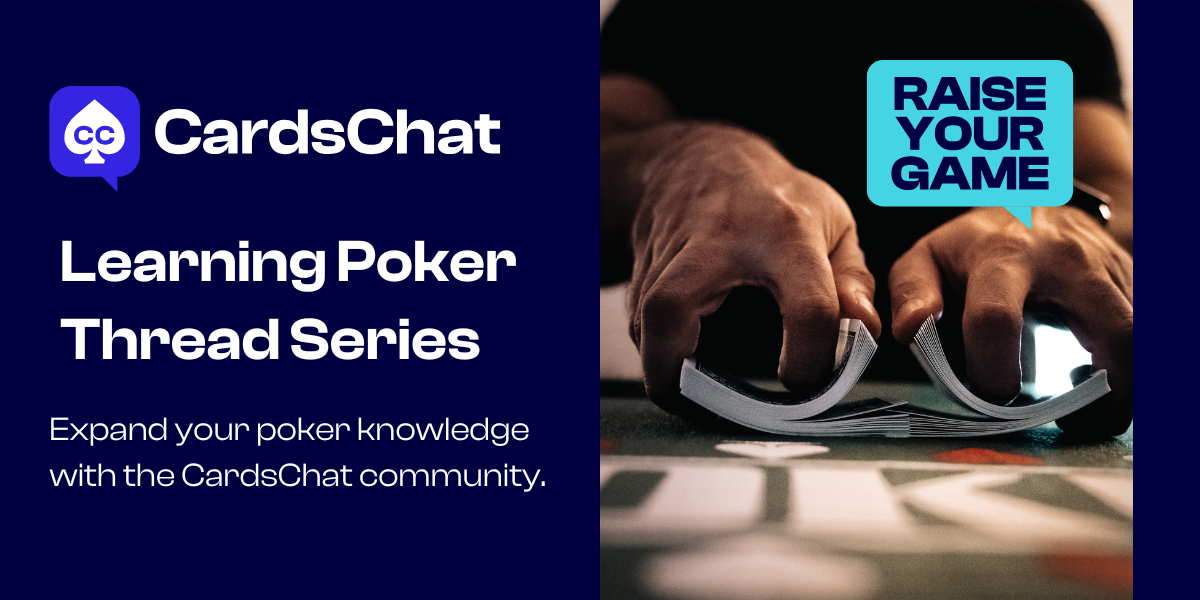CRStals
Moderator
Moderator
🎭 The Psychology of Poker: How the Game Impacts Our Lives
Poker is more than just cards and chips—it’s a mental and emotional battlefield. For many of us in the community, the game is a passion, a pursuit of skill, and a constant challenge. But for those outside the poker world, the perception can be very different.In this first article of our Psychology of Poker series, we explore the negative impacts of poker—both real and perceived—and how players can manage those challenges. Whether you're a recreational grinder or aspiring pro, understanding the psychology behind poker is essential to staying balanced, healthy, and in love with the game.
🔍 What You'll Learn
- Common misconceptions about poker
- The real-life downsides of playing poker
- How to spot warning signs in yourself or others
- Ways to reframe poker positively for outsiders
💥 The Public Perception Problem: Is Poker Just Gambling?
Poker fans know it's a game of skill—but outsiders often see something very different. Understanding how the public perceives poker is the first step to changing the narrative.
🎭 Misconceptions About Poker:
- “It’s just gambling.”
Many lump poker in with games of pure chance, failing to recognize the skill, math, and strategy involved. - “Poker players are degenerates.”
Long sessions, financial swings, and emotional highs and lows can paint players in a negative light—especially when shared without context. - “Poker is tied to organized crime.”
While this stereotype is outdated, historical connections to underground games and mob ties persist in some minds. - “It looks easy—just follow the pros.”
People often see televised wins but never the hours of study, variance, or brutal downswings it takes to succeed.
💥 How Poker Can Affect You Negatively
Even for those who understand and love the game, poker comes with risks. Without balance, the game can impact your health, finances, and mental wellbeing.⚠️ Key Areas of Concern:
- Disrupted Sleep Cycles
Late-night tournaments, long cash sessions, and chasing losses can destroy healthy sleep patterns. Marathon sessions (like the 124-hour record by Zach Gensler!) are impressive but unsustainable. - Emotional & Mental Health
Bankroll swings can cause anxiety, depression, or burnout—especially when poker is your main source of income. - Loss of Joy
When poker becomes more job than game, the stress of chasing profit can erode the love that drew you in. - Reliance on Stimulants
Caffeine, energy drinks, or worse—some players turn to unhealthy aids to stay alert, which can quickly become dependencies. - Physical Stress
Bottling up tilt or internalizing frustration over bad beats can create harmful long-term stress on your body. - Financial Pressure
Pro-level poker isn’t just buy-ins and winnings—it includes taxes, travel, and living expenses. Few people realize how thin the margins can be.
💥 Spotting the Red Flags: When Poker Goes Too Far
Whether it’s you or someone else, recognizing the warning signs early can prevent long-term harm.🚩 Common Red Flags:
- Suddenly borrowing money to play
- Constant exhaustion and sleep deprivation
- New habits like smoking, excessive caffeine, or energy drinks
- Personality shifts—more irritability or withdrawn behavior
- Once-social players becoming isolated and overly focused on poker
💥 Teaching the Positives: Changing the Conversation Around Poker
Let’s face it: poker can get a bad rap. But with the right message, we can highlight how poker builds skills that matter in real life.🎯 The Upside of Playing Poker:
- Sharpens Problem Solving
Poker forces you to make fast decisions with incomplete information—just like real life. - Improves Risk Assessment
Every hand is a lesson in evaluating risk versus reward, which helps with decision-making outside the game too. - Boosts Confidence
Building a winning strategy and seeing it succeed gives players real self-assurance. - Strengthens Memory & Focus
Remembering hands, ranges, and betting patterns hones memory and attention to detail. - Encourages Social Interaction
Especially in live games, poker creates social opportunities and helps improve reading people. - Teaches Long-Term Thinking
Poker is a long game—variance means you win over time, not every session. Learning to zoom out is a skill in itself. - Applies Statistical Thinking
From hand equity to expected value, poker strengthens your understanding of math and probability—skills used in finance, analytics, and beyond.
🎯 Final Thoughts: Balance the Game, Change the Perception
Since the Moneymaker boom, poker has grown in popularity and respectability. But public misconceptions still linger—and for some, the game can become harmful without the right mindset and support.By:
- Recognizing the warning signs early
- Practicing self-care and emotional awareness
- Educating others on the benefits of the game
💬 How Do You Handle Poker’s Dark Side?
Have you had to help a fellow player struggling with burnout or bankroll issues? Ever found yourself defending poker to someone who didn’t get it?Share your stories below—and let’s keep the conversation open, honest, and helpful. 🗣️👇
🔔 Never Miss an Update – Subscribe to the CardsChat Learning Series
Stay sharp and keep leveling up your game. Subscribe to get updates on future lessons in this series and explore the full library of content here:👉 CardsChat Learning Poker Thread Series Guide















